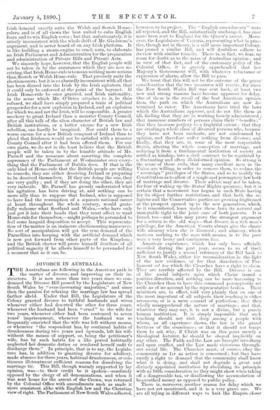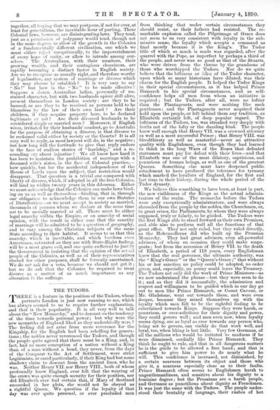DIVORCE IN AUSTRALIA. T HE Australians are following in the American
path in the matter of divorce, and improving on their in- structors. It is now more than two years since we con- demned the Divorce Bill passed by the Legislature of New South Wales by " ever-increasing majorities," and since then the passion for relaxing the marriage law has spread farther afield. Under that Bill, the Legislature of the Colony granted divorce to faithful husbands and wives whenever either had deserted the other for three years, whenever the husband had been " cruel" to the wife for two years, whenever either had been sentenced to seven years' imprisonment, whenever the husband was so frequently convicted that the wife was left without means, or whenever " the respondent has, by continual habits of drunkenness during two years and upwards, left his wife without the means of support, or, being the petitioner's wife, has by such habits for a like period habitually neglected her domestic duties or rendered herself unfit to discharge them." In principle, that is to say, the Legisla- ture has, in addition to granting divorce for adultery, made absence for three years, habitual drunkenness, or con- tinuous ill-treatment sufficient reasons for dissolving the marriage tie. This Bill, though warmly supported by lay opinion, was—to their credit be it spoken—resolutely opposed by the clergy of all denominations, and when it was sent home for the assent of the Crown, was returned by the Colonial Office with amendments such as made it more consistent alike with English law and the Christian view of right. The Parliament of New South Wales adhered, however, to its project. The " English amendments " were all rejected, and the Bill, substantially unchanged, has once more been sent to England for the Queen's assent. More- over, the Legislature of Victoria, representing what in prac- tice, though not in theory, is a still more important Colony, has passed a similar Bill, and will doubtless adhere to its view with similar tenacity. There is, in fact, we fear, no room for doubt as to the mass of Australian opinion ; and in view of that fact, and of the customary policy of the Colonial Office, it is gravely apprehended that her Majesty's Government will, with whatever reluctance or expression of alarm, allow the Bill to pass. We trust that this will not be the outcome of the grave consideration that the two measures will receive, for since the New South Wales Bill was sent back, at least two new and strong reasons have become apparent for delay. One of these is the recoil of the best American opinion from the path on which the Australians are now de- termined to enter. The Americans have tried the laws which the Australians approve, and do not like them at all, finding that they are in working loosely administered ; that immense numbers of persons claim their " benefits ; " that they increase perjury to a frightful extent ; that they are creating a whole class of divorced persons who, because they have not been unchaste, are not condemned by opinion, and therefore suffer nothing from divorce ; and finally, that they are, in some of the most respectable States, altering the whole conception of marriage, and reducing it from a fundamental institution of society as settled as kinship, into a civil contract to be regulated by a fluctuating and often ill-informed opinion. So strong is the sense of these evils, that many excellent men in the Union are-willing, in order to remove them, to reduce the " sovereign" privileges of the States, and so to modify the Constitution as to allow of a single and peremptory law both of marriage and divorce. Their advice may not be taken, for fear of waking up the States' Rights question; but it is certain that a movement has begun in each State having for its object further restrictions, and that both the re- ligious and the Conservative parties are growing frightened at the prospect opened up to the new generation, which, be it remembered, loses under these laws its natural and immutable right to the joint care of both parents. It is found, too—and this may prove the strongest argument for a return to the old ways—that divorce is a rich man's privilege, for the American Courts always give the chaste wife alimony when she is divorced ; and alimony, which matters nothing to the man with means, is to the poor man a very heavy and continuous fine.
American experience, which has only been officially recorded during the past year, seems to us of itself sufficient to justify a second reference of the Bill back to New South Wales, either for reconsideration in the light of the new evidence, or for that dissolution of Par- liament ad hoc which the Churches have a right to claim. They are terribly affected by the Bill. Divorce is one of the social subjects upon which Christ issued a positive direction, and nothing can be more harassing to the Churches than to have this command peremptorily set aside as of no account by the representative bodies. Their ministers are, in effect, told very plainly that on one of the most important of all subjects their teaching is either erroneous, or is a mere counsel of perfection ; that they wholly misapprehend the nature of marriage ; and that, whatever they may say, it is not a divine, but a purely human institution. It is simply impossible that such teaching should not sink deep among a people with whom, as all experience shows, the law is the grand buttress of the conscience ; or that it should not tempt them to ask why, if Christ was on this point merely a theological lecturer, he should be obeyed implicitly on any other. The Faith and the Law are brought into sharp and open conflict, and the Law made victorious through- out social life. The Churches must, of course, obey the community as far as action is concerned ; but they have surely a right to demand that the community shall know what it is doing, and shall not degrade a great and divinely appointed institution by abolishing its principle with as little consideration as they might show when taking off a disagreeable tax, or disallowing the accumulation of bequeathed money as opposed to public policy.
There is, moreover, another reason for delay which we have not yet mentioned, and it is a very grave one. We are all trying in different ways to knit the Empire closer together, all hoping that we may postpone, if not for ever, at least for generations, the inevitable hour of parting. These Colonial laws, however, are disintegrating laws. They tend, just as a permission of polygamy would tend, though not in the same degree, to allow of the growth in the Colonies of a fundamentally different civilisation, one which we must either reject unequivocally, to the impoverishment of every hope of unity, or allow to intrude among our- selves. The Australians, with their numbers, their growing wealth, and their contagious cheeriness, are rapidly becoming a distinct factor in English society. Are we to recognise as morally right, and therefore worthy of legalisation, any system of marriage or divorce which they may choose to establish ? It is very easy to say " No !" but how is the " No " to be made effective ?
Suppose a dozen Australian ladies, personally of un- stained character, but with two husbands apiece still alive, present themselves in London society : are they to be banned, or are they to be received as persons held to be blameless by the law of their own land ? Are their children, if they acquire property here, to be declared legitimate or not ? Are their divorced husbands to be considered single or married men ? Moreover, if English wives, irritated by their husbands' conduct, go to Australia for the purpose of obtaining a divorce, is that divorce to be reckoned valid either by society or the Courts? It is all very well to reply, as most lawyers will do, in the negative ; but how long will the fortitude to give that reply endure in the face of endless stories of "hardship," and a re- sounding cry about injustice ? We all know how hard it has been to maintain the prohibition of marriage with a deceased wife's sister, in the face of Colonial practice,— how quickly, but for the accidental independence of the House of Lords upon the subject, that restriction would disappear. That question is a trivial one compared with liberty of divorce, which, if adopted in all the free Colonies, will land us within twenty years in this dilemma. Either we must acknowledge that the Colonies can make laws bind- ing on us as well as themselves—binding, that is, through our obligation to acknowledge them in our own Statutes of Distribution—or we must accept in society as married, thousands of persons whom we declare at the same time not to be morally married at all. There must be either legal anarchy within the Empire, or an anarchy of social opinion, with the result in either case that the sanctity of marriage will be admitted to be a question of geography, and to vary among the Christian subjects of the same state according to their habitat. It seems to us that this anarchy, which is inevitable, and which burdens even Americans, saturated as they are with State-Right feeling, will be a most grave evil, and one quite sufficient to justify the Government in insisting that the opinion of the actual people of the Colonies, as well as of their representatives elected for other purposes, shall be formally ascertained. We do not ask for a veto, because we should not get it ; but we do ask that the Colonies be required to treat divorce as a matter of as much importance as any alteration in the suffrage.















































 Previous page
Previous page